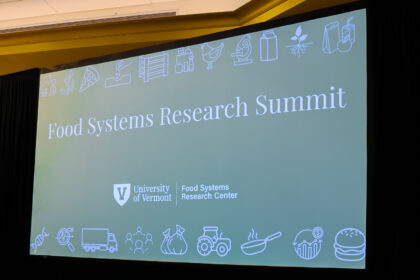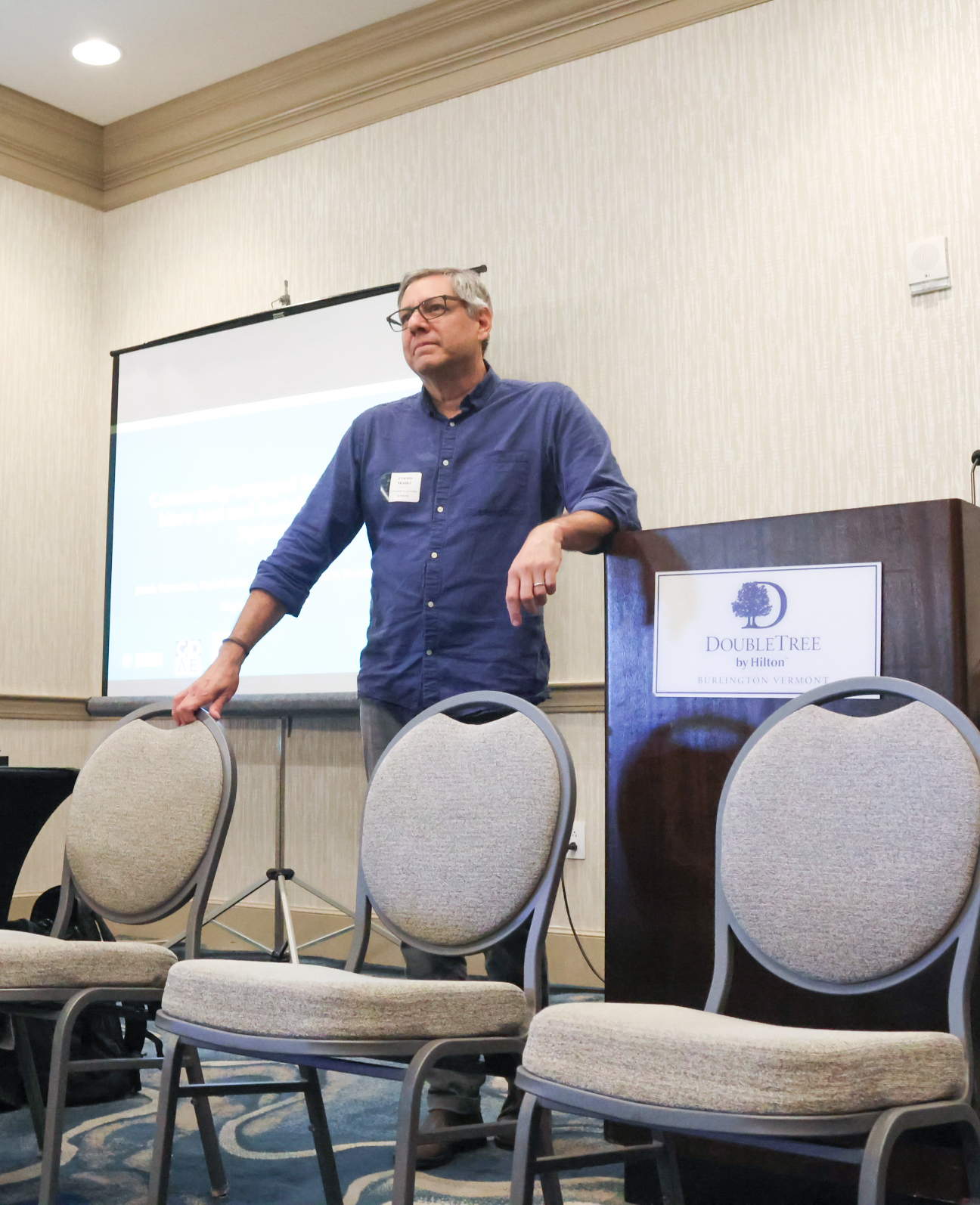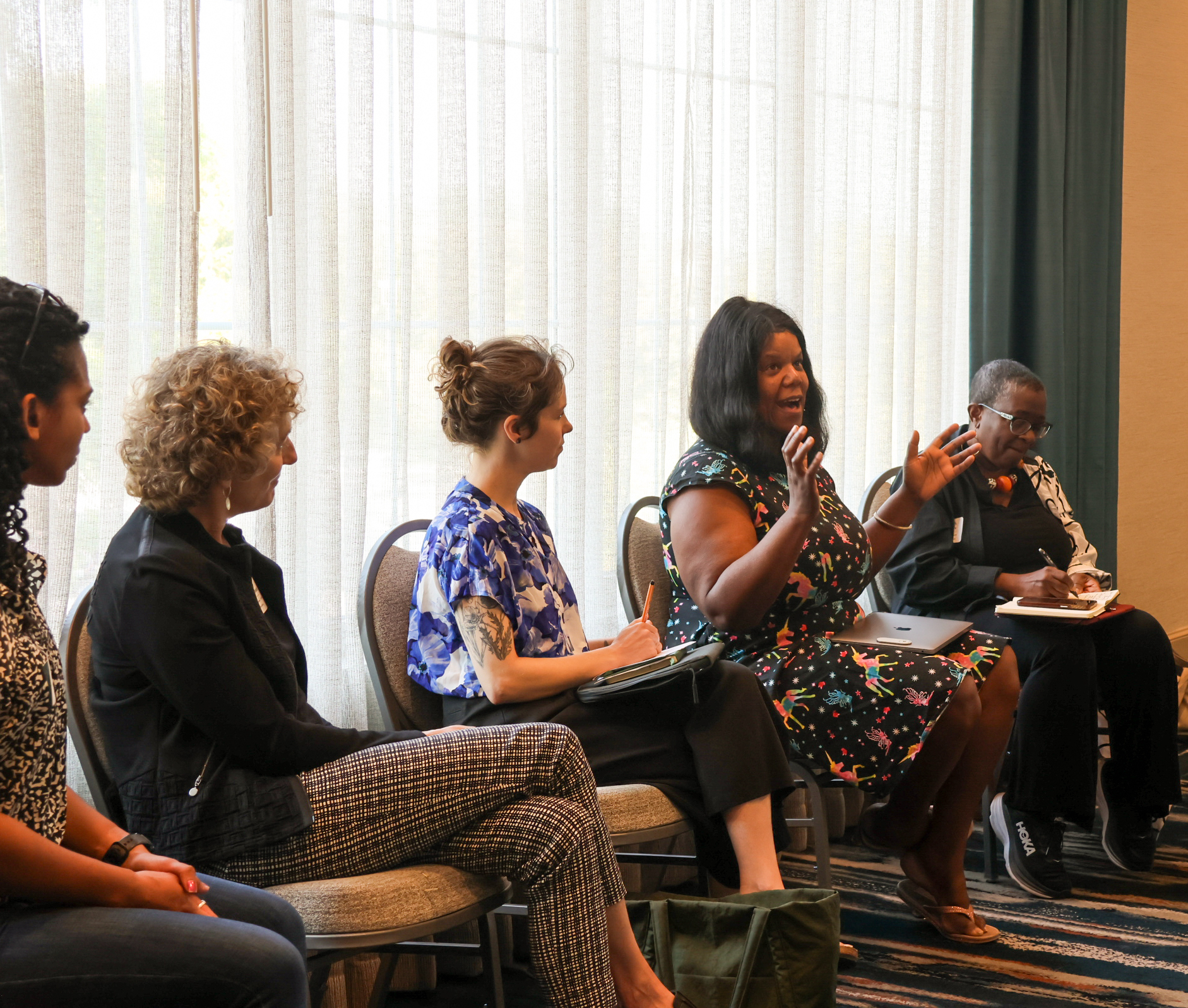
By Karen Nordstrom, Policy Program Co-Director, Food Solutions New England
The Food Systems Research Center (FSRC) Summit held in September 2024 brought together leading thinkers and practitioners in the field of food systems, offering a wealth of insights into regional, integrated, and intersectional approaches to food systems transformation. Sessions covered a wide range of topics including decentralizing whiteness, narrative, integrated approaches for regional policy, and many more. While presented separately, all of the approaches summarized below intersect to create more equitable, sustainable, and resilient food systems. Ultimately, it is through integrated collaboration that transformative change will be realized in the food system and beyond.
Presentation Summaries
Centering Equity and Lived Experience
Dr. Angela Odoms-Young set the tone for the summit by emphasizing the critical importance of centering equity and lived experience in food systems work. Her presentation highlighted the need to:
- Address root causes of inequities rather than just symptoms
- Decentralize whiteness in food systems research and practice
- Integrate anti-racist approaches in all aspects of food systems work
Dr. Odoms-Young’s focus on “Freedom Dreaming” as a tool for change resonates deeply with the need for transformative visions in food systems work. This approach aligns well with the power of narratives in shaping food systems, as discussed by Dr. Molly Anderson later in the summit.
Regional Approaches to Food Systems Governance
Dr. Jill Clark’s presentation on regional Food Policy Councils (FPCs) offered valuable insights into the growing importance of regional governance in food systems transformation. Key points include:
- The rise of collaborative, voluntary groups in addressing food system challenges
- The importance of regional identity and shared fate in fostering cooperation
- The need for FPCs to balance credibility and legitimacy while amplifying community voices
These regional approaches provide a crucial middle ground between local and national efforts, allowing for more coordinated and impactful interventions.

Ernesto Méndez, UVM Institute for Agroecology, co-faciliates the PAR session. Photo by Ella Yates, UVM Institute for Agroecology
Community-Based Participatory Action Research (PAR )
A crucial session at the summit, focused on Community-Based Participatory Action Research (PAR), was facilitated by the UVM Institute for Agroecology (IfA). It emphasized the importance of collaborative, community-centered research approaches in food systems work. Key insights include:
- Prioritizing community needs and voices over academic publications
- Recognizing lived experience as expertise
- Developing collaborative research designs with clear principles and partner roles
- Building trust and fostering two-way communication between researchers and community partners
- Addressing institutional challenges in implementing true PAR methodologies
This session highlighted the need for a paradigm shift in how we approach food systems research, emphasizing the importance of equitable partnerships and actionable outcomes that directly benefit communities.
The New England Integrated Policy Program (NEIPP)
A key session at the summit, co-facilitated by the Food Solutions New England (FSNE) team, focused on the New England Integrated Policy Program (NEIPP). This project exemplifies how regional approaches can be applied to specific food system challenges. Key insights from this session include:
- The importance of land equity and sovereignty in procurement policies
- The need to balance conservation goals with supporting working lands
- The value of cross-territorial learning in developing effective policies
- The critical role of stakeholder engagement in food system mapping and policy development
NEIPP demonstrates how regional initiatives can address complex issues like land access, biodiversity conservation, and institutional procurement in an integrated manner.
The Power of Narratives in Shaping Food Systems
Dr. Molly Anderson’s session on narratives in food systems transformation highlighted the crucial role that stories play in driving or hindering change. She categorized narratives based on their potential for structural transformation:
- Narratives that don’t require structural transformation (e.g., technological innovation)
- Narratives that might support structural transformation (e.g., social innovation, legal strategies)
- Narratives that require structural transformation (e.g., food sovereignty, agroecology)
This framework provides a valuable tool for assessing and developing strategies for food systems change, particularly when combined with regional and equity-focused approaches.
Integrating Regional, Participatory, Equity-Focused, and Narrative-Driven Approaches

Kafi Dixon, Executive Director at Women of Color Rural & Urban Farmer Cooperative, contributes insights during the PAR breakout group. Photo by Ella Yates, UVM Institute for Agroecology
The intersection of these presentations offers a powerful framework for advancing food systems transformation:
- Regionally-Tailored Equity Initiatives: Regional FPCs and projects like NEIPP can serve as platforms for implementing equity-focused initiatives that address the specific historical and cultural contexts of their areas, including structural and systemic discrimination and other harms.
- Community-Centered Research: PAR methodologies can ensure that research is grounded in community needs and experiences, leading to more relevant and impactful outcomes.
- Amplifying Diverse Voices: Regional governance structures and projects can create spaces for all voices, especially those historically subjected to marginalization, to influence both policy and broader cultural narratives about food.
- Holistic Approach to Procurement: NEIPP demonstrates how procurement policies can be leveraged to address multiple food system goals, including equity, land access, and environmental conservation.
- Narrative Shift at the Regional Level: FPCs and regional projects can play a crucial role in shaping regional narratives about food systems. Especially by working together, they can accelerate the adoption of transformative approaches.
- Bridging Theory and Practice: The integration of Community-Based PAR methodologies with Dr. Odoms-Young’s theoretical frameworks, Dr. Clark’s practical insights on regional governance, NEIPP’s on-the-ground experience, and Dr. Anderson’s narrative analysis provides a comprehensive toolkit for food systems practitioners. This approach can ensure that academic theories are grounded in community realities and that practical initiatives are informed by robuts conceptual frameworks.
Moving Forward: Implications for Food Systems Work
In reflection on these insights from the FSRC Summit, several key implications emerge for food systems researchers, practitioners, and policymakers. There is an acute need to:
- Embrace community-based participatory research methods to ensure research is relevant, equitable, and actionable.
- Prioritize equity and lived experience in all food systems initiatives, from research design to policy implementation, especially for those who have been subjected to discrimination.
- Invest in regional governance structures and projects that can bridge local and national efforts while fostering a sense of shared identity and purpose.
- Critically examine and strategically shape narratives about food systems, with a focus on those that drive structural transformation.
- Use institutional procurement as a lever for broader food system transformation, addressing issues of land equity, conservation, and economic development.
- Develop integrated approaches that combine community-based participatory research, regional governance, equity-focused initiatives, and powerful narratives to drive systemic change.
Embracing these and integrated approaches will allow the work towards food systems that are more resilient and sustainable as well as just and equitable for all to flourish.
What insights from the FSRC Summit resonate most with your work? How might you apply these integrated approaches to drive transformation in your local or regional food system? We’d love to hear your thoughts and experiences as we collectively work towards a more just and sustainable food future.




